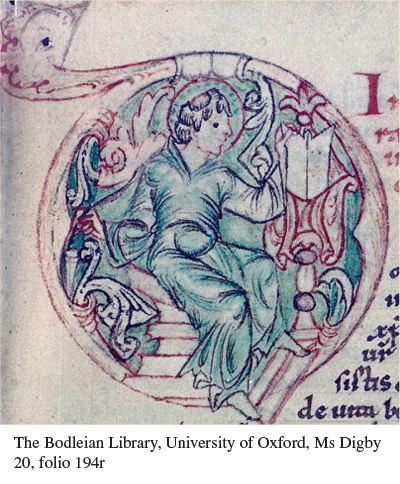A History of Western Society: Printed Page 236
A History of Western Society, Concise Edition: Printed Page 238
Chapter Chronology
Individuals in Society
Page 236

A manuscript portrait of Bede, set within the first letter of a copy of his Life of St. Cuthbert. This is the letter d, with the monster’s head forming the upward line and Bede’s foot the short downward line. There are no contemporary descriptions of Bede, so the later manuscript illuminator was free to imagine what he looked like.
(The Bodleian Library, University of Oxford, Ms Digby 20, folio 194r)
T he finest representative of Northumbrian, and indeed all Anglo-Saxon, scholarship is Bede (ca. 673–735). He was born into a noble family, and when he was seven his parents sent him to Benet Biscop’s monastery at Wearmouth as a sign of their religious devotion. Later he was sent to the new monastery at Jarrow five miles away. Surrounded by the hundreds of pagan and Christian books Benet Biscop had brought from Italy, Bede spent the rest of his life there, studying and writing. He wrote textbooks on grammar and writing designed to help students master the intricacies of Latin, commentaries on the Old and New Testaments, historical works relating the lives of abbots and the development of the church, and scientific works on time. His biblical commentaries survive in hundreds of manuscripts, indicating that they were widely studied throughout the Middle Ages. His doctrinal works led him to be honored after his death with the title “Venerable,” and centuries after his death to be named a “doctor of the church” by the pope.
Bede’s religious writings were actually not that innovative, but his historical writings were, particularly his best-known work, the Ecclesiastical History of the English People, written about 720. As the title suggests, Bede’s main topic is the growth of Christianity in England. The book begins with a short discussion of Christianity in Roman Britain, then skips to Augustine of Canterbury’s mission to the Anglo-Saxons (see Chapter 7). Most of the book tells the story of Christianity’s spread from one small kingdom in England to another, with missionaries and the kings who converted as its heroes, and the narrative ends with Bede’s own day. Bede searched far and wide for his information, discussed the validity of his evidence, compared various sources, and exercised critical judgment. He includes accounts of miracles, but, like the stories of valiant missionaries, these are primarily related to provide moral lessons, which all medieval writers thought was the chief purpose of history.
One of the lessons that Bede sought to impart with his history is that Christianity should be unified, and one feature of the Ecclesiastical History of the English People inadvertently provided a powerful model for this. In his history, Bede adopted a way of reckoning time proposed by an earlier monk that would eventually provide a uniform chronology for all Christians. He dated events from the incarnation of Christ, rather than from the foundation of the city of Rome, as the Romans had done, or from the regnal years of kings, as the Germans did. His history was recopied by monks in many parts of Europe, who used this dating method, anno Domini, “in the year of the Lord” (later abbreviated A.D.), for their own histories as well. (Though Bede does talk about “before the time of the incarnation of our Lord,” the reverse dating system of B.C., “before Christ,” does not seem to have been widely used before 1700.) Disputes about whether the year began with the incarnation (that is, the conception) of Christ or his birth, and whether these occurred in 1 B.C. or A.D. 1 (the Christian calendar does not have a year zero), continued after Bede, but his method prevailed.
- How do the career and accomplishments of Bede fit with the notion of an early medieval “renaissance” of learning?
- Does Bede’s notion that history has a moral purpose still shape the writing of history? Do you agree with him?
- The Christian calendar dates from a midpoint rather than from a starting point, the way many of the world’s calendars do. What advantages does this create in reckoning time? What would you see as the primary reason that the Christian calendar has now been widely adopted worldwide?
